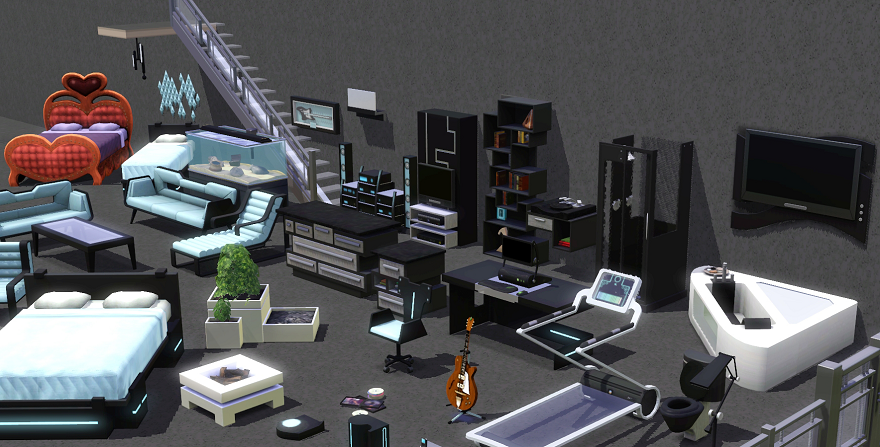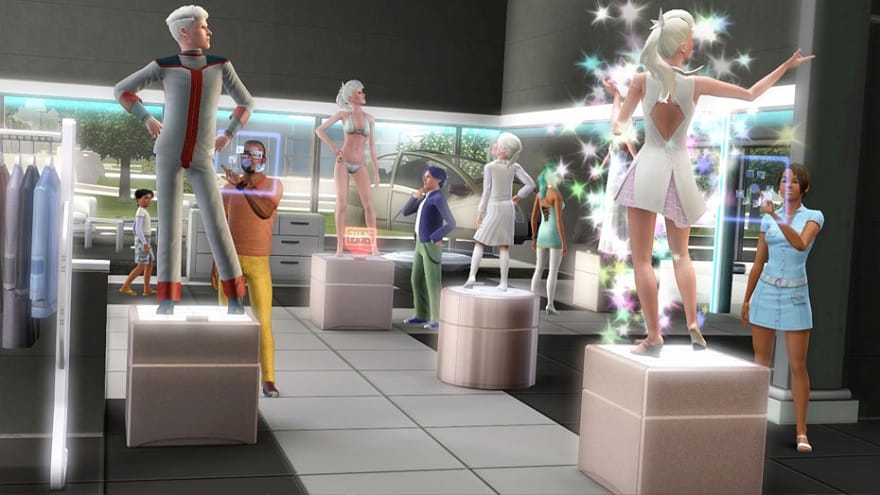There is only one way to play the Sims, and that is to cheat

The Sims franchise is widely regarded as a reproduction of the capitalist system we all tolerate in real life. The difference is that The Sims’ capitalist utopia is immune to the violent unpredictability of human nature. Institutionalized discrimination and irrational greed do not exist. The system is bizarrely fair and free of corruption. Everyone can find a job and reach the top with good, old-fashioned hard work. This is represented through pretty standard mechanics; players are rewarded for fulfilling conditions and filling meters; the only difference from other games is that these functions are simplified real-life functions. Each volume of The Sims (we’re up to four now) and the accompanying expansion packs add more status bars and new quantified desires. The continued layering of mechanics convolute what was once a very simple game, so simple we all know it already: eat, sleep, work, spend. This grind is as boring as it is when we slog through it in real life. True to capitalism, no one plays the game for the grind. Everyone plays for the reward, for the stuff.
The majority of hardcore sim players aren’t drawn to the game for its striving mechanical realism. For them, The Sims is a game of stuff, of thousands of polygons and textures. Houses, couches, beds, pool tables, paintings that cost 10 sim paychecks, the pages of clothing and hair. Expansion packs that add even more stuff; pets, cars, college, vacation. Stuff to look at. Stuff to consume. Stuff to do. Game events are equally hollow commodities; animations for promotions, first kisses, weddings, pregnancy, cooking mac and cheese. These are exciting the first time and a cut-scene to fast forward through every time after. The stuff serves a purpose. Game objects and events facilitate players’ creativity in its various forms, whether it be role-playing, storytelling or building. Every style of player lives for the stuff; rules and mechanics are optional.
The Sims capitalized on this culture by monetizing the culture of customization
If you play The Sims, there is only one way to play The Sims, and that is to cheat. The Sims, while structured like capitalism, is a space to act out fantasies of cheating capitalism. I’ll remember these cheats till the day I die: boolprop testingcheatsenabled true. kaching. rosebud. motherlode motherlode motherlode. Why grind through a cartoonish knock off of real life when cheating is so easy? Motherlode, rosebud and kaching are what the sound like: chunks of simoleons, the currency in the games. Boolprop isn’t as self-explanatory. Boolprop allows the player to set all want, need, and relationship meters with ease. In addition, all game events can be called by right clicking a sim and spawning debugging objects. The objects, disguised as regular game objects, can kill or age any sim, spawn special unplayable characters like the Social Bunny or the Grim Reaper, and make Sims pregnant (or alien pregnant).
Cheating allows players to bypass any mechanics they want. For dedicated roleplayers, the most mundane mechanics like tending needs and making money are the biggest obstacles on the pursuit of obtaining and unlocking stuff. Tired, hungry, broke Sims don’t throw pool parties, buy new cars or reach the top of their career field. Money also poses a problem for players who like to build, as the most extravagantly designed and decorated homes require thousands of simoleons. The most dedicated cheaters are those players who film stories, who mold Sims into characters and twist game events into a plot. This is a serious mode of playing that involves very little play at all. It’s all strategic cheating.
This level of cheating is hardly fun for those players who like to experience every corner of that the game has to offer. This leads to creating a custom system that combines obeying and breaking the rules. The point isn’t to cheat through every single aspect of the game, only the parts that prevent you from achieving your desired goal. To throw a successful pool party, maximize your Sims’ needs and relationship sliders with the guests over the course of the party. For a new car, motherlode. To get a promotion, simply use boolprop to add the skill points and contacts you need or just spawn a debugging object that allows you to set the work level. Then sit back and enjoy as your Sims act out what you commanded. You’re still playing, but only the parts you want to play.

The above method of cheating, and the term “boolprop” specifically, comes from The Sims 2. The syntax has since been simplified to not include boolprop, but “testingcheats” doesn’t have quite the same ring to it. While cheating was a part of the first Sims game, it became essential with The Sims 2, the first glossy 3D game in the franchise. The improved graphics contributed to the contemporary stuff-centric design of The Sims. The stuff in The Sims 2 was simply more desirable than the stuff of the first Sims game. All this fancy new 3D stuff motivated players to cheat, but that isn’t all it encouraged. The early release of a stand alone “Create-a-Sim” included the ability to upload custom reskinnings, building hype around the much touted open-ended creativity. After the game’s full release, players quickly took advantage of the customization features, going beyond re-skinning and creating custom 3D meshes for objects, clothing and hair. This grew into a community of players altering the core game and its mechanics through cheating, creating custom content, and of course modding. The Sims community is not dissimilar from those modding communities that develop around other open-ended games. But cheating instilled in Sims players a special hunger for continued consumption that led to the massive amounts of user-created stuff.
When using cheats like kaching and boolprop it doesn’t take long to see everything, still craving more. This is why custom content has become an integral part of the game for many players. Hundreds of websites host thousands of user-created content, most of it free or only costing a few dollars for premium quality. You could download and add to the game forever, for free. Downloading stuff may not be like owning tangible objects, but it can certainly feel that way: consumption without cost or consequences. Not exactly no consequences, as your hard drive can only handle so much premium high-poly anime hair. Custom content isn’t guaranteed to not crash the game or your computer. While most objects were harmless, there was always the danger of downloading too much furniture or adding a buggy mod that forces you to re-install the whole game along with whatever expansion packs you purchased. Even when custom content worked, lots of it, especially the furniture, looked amateurish and out of place among the professional-quality core in-game objects. Despite its downfalls, custom content gave players the ability to add what the core game and expansion and stuff packs left out. Stuff like: creepy hyper realistic eyes, anatomically correct nude skins, sci-fi and fantasy elements, a perfect replica of the house from Rosanne, etc. thesimsresource continues to hosts hundreds of home-grown artists making content for all editions of the game. The Sims 3 & 4 support user-created content. However, the game has evolved to accommodate the impulse to cheat, add to and alter the core game after The Sims 2.
the stuff is more than stuff
Maxis realized no one was playing their games just to watch a Sim sleep till the need bar turned solid green or to try to make sure a Sim doesn’t pee herself as soon as she got off work. Sending your sim to bed isn’t as fun as owning the bed. Going to the bathroom isn’t as fun as hunting the internet for a matching lavender bathroom set and placing it in your Sim’s house so she can never use it. The Sims 3 and The Sims 4 consider cheating and auxiliary content in their design. These editions of The Sims capitalized on this culture by monetizing the culture of customization that bloomed in The Sims 2. There is such a high saturation of objects and events in The Sims 3, they can’t expect anyone to play by the rules 100% of the time.

Auxiliary content isn’t a new concept in The Sims. Expansion packs have been an integral part of the games since the first one. These themed packs add objects and actions, giving the game a shot in the arm with each new release. Same with the Stuff packs: another innovation of The Sims 2, which only add objects. In addition, The Sims 3 has a studio-sponsored store of downloadable content, stuff to get your fix between expansions. Premium Content in The Sims 3 store offers everything user-made custom content but with studio polish, going beyond simple reskinning or shoddy teenage attempts at maya.
Objects from the Sims store often come with added functionality. Purchasing the deep fryer lets your sim make mozzarella sticks and other oil-drenched American fare. The milking station comes with a cow that produces milk, soy milk and chocolate milkshakes. You can also tip the cow, but that puts your Sim in a bad mood. Again, the stuff is more than stuff. It facilitates role-playing, building and storytelling through film or still images. The furnished estates and community lots similarly enrich the game for players, adding anything from sprawling estates to retro amusement parks, all intricately designed by professional game artists. Also available in the store is the most ambitious downloadable addition to the franchise, “Worlds.” Purchasing and downloading a World will add a full, inhabited neighborhood in your game. These worlds have themes ranging from idyllic beach towns to space colonies to dragon-inhabited valleys. Worlds gives a new framework for player created narratives, but at what cost? Thirty-five dollars each, with 11 available in all. Unfortunately, there’s no cheat code for the Sim store.
It is undeniable—the content in The Sims 3 store not only aims to be more desirable than user-created content, but it is more desirable. Without and endless stream of downloadable content, you’re left with all the stuff and nothing new to do in a game driven by the novelty of newness. The Sims store keeps the game going forever, so you never buy it all, do it all, see it all, cheat it all. This design of endless consumption will continue to be key in The Sims 4, which famously launched without toddlers and pools (keep your eye out for The Sims: Young Life or The Sims: Pool Party expansion packs) Recently, EA started offering a free 48 hour trial of The Sims 4. should commit to the free-to-play model and make the base game free permanently. Although, even if the core game was free, I wouldn’t start playing. If the staggering amount of paid content in The Sims 3 is any indication as to what 4 will be like, I can’t afford to start.



